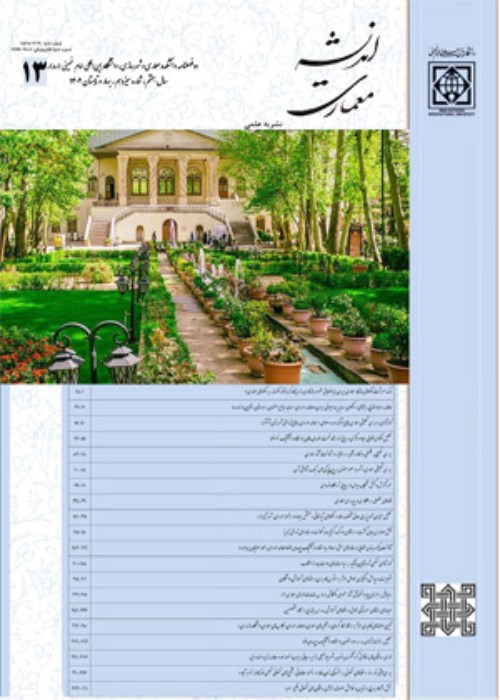Ethical Lifestyle in Interaction with Environmental Capabilities in Traditional Iranian Architecture (Case Study: Azab Daftariller Traditional Neighborhood, Tabriz, Iran)
The achievement of an ethical lifestyle is a very complex issue whose roots can be found in the interaction between the environment and our existential aspects as humans. In any environment, we seek to make the most of available environmental capabilities to meet a variety of individual and social needs. We tend to modify our surroundings to fit our own existential aspects and to make life more desirable.The purpose of this study is to identify and explore the relationship between environmental capabilities and existential human aspects in line with the achievement of an ethical lifestyle. The present study seeks to answer the following question: How can we explain the relationship between environmental capabilities and an ethical lifestyle? Previous theoretical studies suggest that existential human aspects, including internal areas (beliefs; feelings/emotions; intentions/desires) and external areas(speech; behavior) interact with environmental capabilities(physical,social,symbolic) to influence lifestyle-shaping variables(scope, capital, character,practice, symbols, class, and disposition). In order to achieve a moral lifestyle and thus a moral behavior in humans, there are stages for ethics to actualize in practice – stages that express the processs of knowlege and practice in an ethics-forming way. The stages of the development of ethical behavior from the Islamic point of view are as follows: intention and potntial(knowlege and possibility); action (idea/mind); reaction (manifestation/apparent behavior); character stage(habit/stability); culture and method (expansion/pattern formation/propagation).At each of these stages, environmental capabilities affecting existential human aspects provide the context for the formation, consolidation, and institutionalization of an ethical lifestyle. Perhaps the most important feature that one should consider in today’s consumer world is choice. One’s choice in the face of a multitude of consumption patterns will lead to one’s distinction (symbols) from other social spaces (scopes/areas) and will bring about unity among the members of the social space (class). The important point in this choice is that the social structure chosen according to an ethical lifestyle must be consistent with the nature of one’s beliefs and ideas to prepare the ground for an ethical lifestyle (character). After choosing the desired social structure, one must take steps to develop one’s second existential aspect, that is, the area of emotions, affects and feelings. In other words, by foregrounding the symbolic principles of belief and thought (symbols), one’s attitudes, desires, tendencies, values and insights help nurture and develop one’s existential aspects. In the meantime, maybe the environment (social, economic and cultural capital) pose limitations for the individual. The only way to overcome these environmental constraints is to have a strong will (strengthening one’s will and intention) which plays a central role in achieving an ethical lifestyle. When one understands the ethical way of living according to his/her internal areas of existence, one can actualize (turn into practice) one’s internal areas through one’s external areas (speech and action). In addition, objective and subjective phenomena, which consititute a set of behavioral patterns in everyone’s lifestyle, should find actual manifestation (character) according to one’s external areas of existence (speech and action). To test the theoretical model of the study, we selected Azab Daftariller, a traditional neighborhood in Tabriz, and sampled 200 participants from among the residents to investigate the effects of environmental capabilities on existential human aspects as the context for the formation of an ethical lifestyle using confirmatory factor analysis. The results indicate that the interactions between physical environmental capabilities on the one hand and human feelings/emotions at the macro-level (in the neighborhood) and human intentions/desires at the micro-level (at home) on the other hand provide the context for the formation of an ethical lifestyle in individuals and in society at large. Moreover, the interaction between social environmental capabilities on the one hand and human speech and behavior at the macro-level (in the neighborhood) and human intentions/desires at the micro-level (at home) on the other hand provide the context for the consolidation of an ethical lifestyle at home and in society and turn it into a personal and social habit. Finally, the interaction between symbolic environmental capabilities on the one hand and human feelings/emotions at the macro-level (in the neighborhood) and human intentions/desires at the micro-level(at home) on the other hand provide the context for the expansion and instutitionalization of an ethical lifestyle among family members and in society at large.
- حق عضویت دریافتی صرف حمایت از نشریات عضو و نگهداری، تکمیل و توسعه مگیران میشود.
- پرداخت حق اشتراک و دانلود مقالات اجازه بازنشر آن در سایر رسانههای چاپی و دیجیتال را به کاربر نمیدهد.



